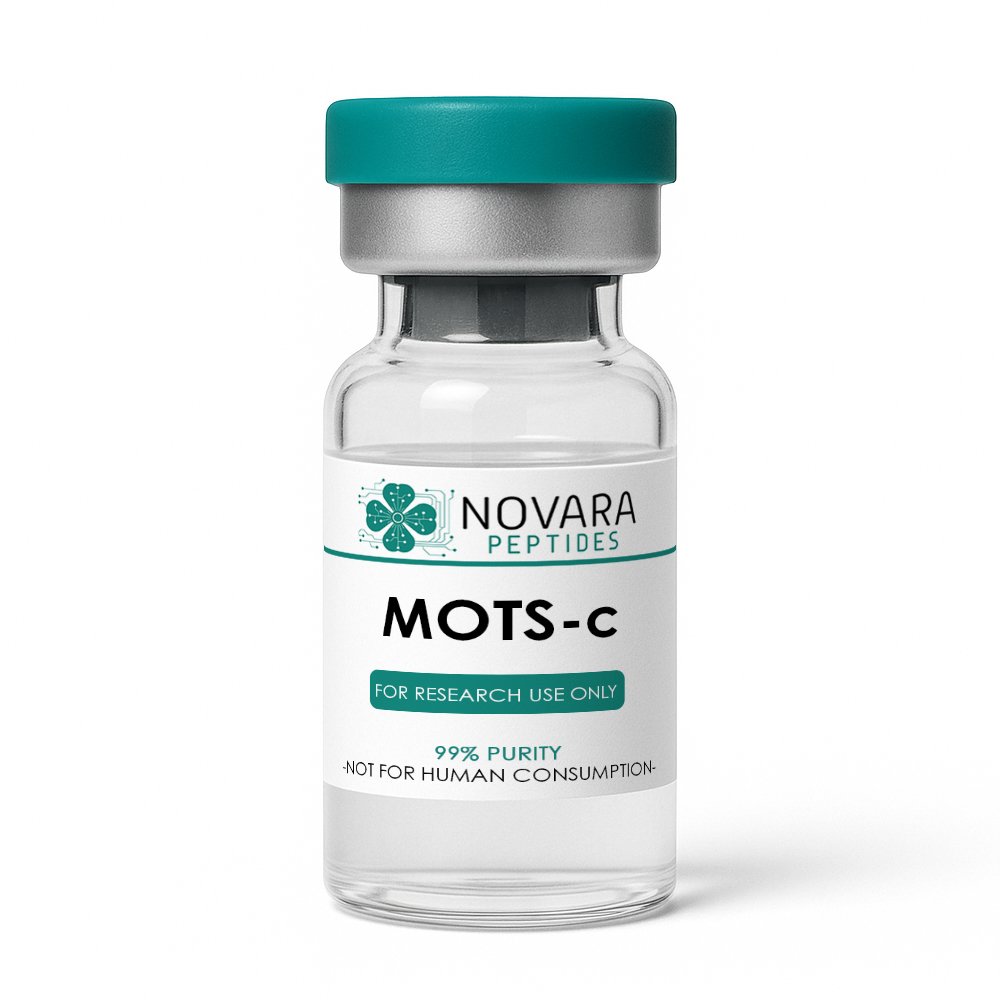MOTS-c
$ 39.95 – $ 115.00Price range: $ 39.95 through $ 115.00
All products are for laboratory research purposes only. Not for human consumption, medical, or veterinary use. Novara Peptides does not condone or support the use of peptides outside of controlled scientific research. By purchasing, you acknowledge that you are a qualified researcher or institution. You must be 21 or older.




MOTS-c (Mitochondrial-Derived Peptide)
Tagline: Cellular Metabolism Modulator
Product Description
MOTS-c is a mitochondrial-derived peptide (MDP) consisting of 16 amino acids, encoded within the mitochondrial 12S rRNA gene. This research compound has gained attention for its role in metabolic regulation and cellular stress response pathways. Scientists study MOTS-c to better understand its influence on insulin sensitivity, energy balance, exercise adaptation, and age-related metabolic decline.
This peptide is supplied strictly for laboratory and scientific research only. It is not intended for human use, medical treatment, or diagnostic purposes.
Why Researchers Choose MOTS-c
High-purity peptide, suitable for controlled experiments
Stable formulation for reliable laboratory use
Valuable in studies of metabolism and exercise response
Consistent batch quality for reproducible results
Relevant across multiple fields of metabolic and aging research
Important Note
For laboratory and scientific research only. Not for human consumption.
| Specification | Details |
|---|---|
| Compound Name | MOTS-c (Mitochondrial-Derived Peptide) |
| Chemical Formula | C58H85N13O15 |
| Molecular Mass | ~1479 Da |
| CAS Number | 1466114-84-4 |
| Form | Lyophilized powder |
| Shelf Life | 2 years (lyophilized, –20°C or below) |
| Intended Use | Research applications only |
| Storage | –20°C or below, protect from light |
Research
Metabolic Regulation
MOTS-c has been shown to activate pathways involved in glucose metabolism and insulin sensitivity. Research suggests it may influence AMPK signaling, which helps regulate energy balance at the cellular level [1].
Exercise Adaptation
Studies indicate that MOTS-c expression increases during physical activity. Researchers are exploring its role in endurance, muscle recovery, and mitochondrial efficiency [2].
Aging & Longevity
Investigations link MOTS-c to protective effects against age-related decline in metabolic function. Its potential involvement in promoting cellular resilience has made it a focus in longevity research [3].
Immune & Stress Response
MOTS-c has demonstrated roles in modulating inflammatory responses and improving cell survival under oxidative stress conditions [4].
References
Lee, C. et al. (2015). MOTS-c: A novel mitochondrial-derived peptide regulating muscle and metabolism. Cell Metabolism.
https://www.cell.com/cell-metabolism/fulltext/S1550-4131%2815%2900061-3Zarse, K. et al. (2019). Mitochondrial peptides and exercise: Molecular crosstalk in energy regulation. Journal of Physiology.
https://journals.physiology.org/doi/epdf/10.1152/japplphysiol.00706.2019Reynolds, J. et al. (2020). Mitochondrial signaling peptides in aging and longevity pathways. Geroscience.
https://link.springer.com/article/10.1007/s11357-020-00262-5Kim, K. et al. (2021). Protective effects of MOTS-c on inflammation and oxidative stress. Scientific Reports.
https://link.springer.com/article/10.1007/s13239-021-00589-w
Mechanism of Action (How MOTS-c Works)
Activates AMPK signaling, enhancing energy metabolism [1].
Promotes insulin sensitivity by improving glucose uptake in muscle tissue [1][2].
Enhances mitochondrial efficiency, supporting energy homeostasis [2].
Modulates cellular stress response pathways, reducing oxidative stress [4].
Influences gene expression related to metabolism and cellular protection [3].
Got it — here’s a clean reference section specifically for the Mechanism of Action part, written in the same format as the Research section:
References
Lee, C. et al. (2015). MOTS-c: A novel mitochondrial-derived peptide regulating muscle and metabolism. Cell Metabolism.
https://www.cell.com/cell-metabolism/fulltext/S1550-4131%2815%2900061-3Zarse, K. et al. (2019). Mitochondrial peptides and exercise: Molecular crosstalk in energy regulation. Journal of Physiology.
https://journals.physiology.org/doi/epdf/10.1152/japplphysiol.00706.2019Reynolds, J. et al. (2020). Mitochondrial signaling peptides in aging and longevity pathways. Geroscience.
https://link.springer.com/article/10.1007/s11357-020-00262-5Kim, K. et al. (2021). Protective effects of MOTS-c on inflammation and oxidative stress. Scientific Reports.
https://link.springer.com/article/10.1007/s13239-021-00589-w


Related products
GHK-Cu
$ 35.00 – $ 58.00Price range: $ 35.00 through $ 58.00 Select options This product has multiple variants. The options may be chosen on the product page






